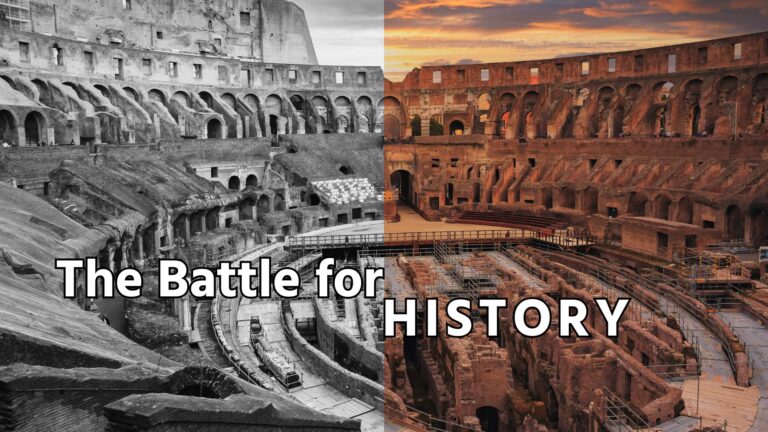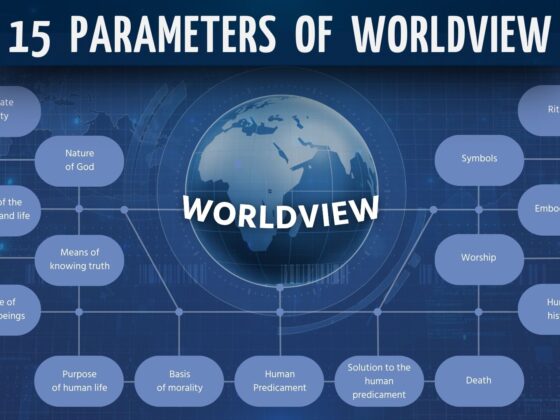The Battle for History: Why Christian Students Need a Biblical Framework – Parameter 11
April 26, 2025
The questions every Christian educator should be asking: Do my students have a mature biblical worldview? How can I know?
History isn’t just a record of past events—it’s a battleground of ideas that shape students’ worldview and faith. Do they see history as God’s unfolding plan, or are they unknowingly adopting secular narratives? Isaiah 46:9-10 reminds us that God declares “the end from the beginning”—history has purpose, direction, and meaning. Without a biblical framework, students risk seeing history as either meaningless or as something to control through human effort.
Note: This article is part eleven in a 15-part series about the parameters of a worldview. You’ll find links to the other articles at the end of this blog post as they become available. If you haven’t read the previous worldview parameter articles, start with part 1 here: Ultimate reality.
What Human History Reveals About God’s Sovereignty and Human Purpose
History is not a series of random events. God is in control, directing all things according to His will. As Daniel 2:21 reminds us, “He changes times and seasons; He deposes kings and raises up others. He gives wisdom to the wise and knowledge to the discerning.” From creation to redemption, history unfolds with purpose, culminating in Christ’s reign (Colossians 1:16-17).
Humanity has a unique role in this plan. We are created in God’s image, called to steward the earth, and designed for relationship with Him (Genesis 1:26-28). Psalm 8:4-6 reinforces this: “What is man that you are mindful of him… You made him ruler over the works of your hands.” If students miss this biblical foundation, they will struggle to find meaning in history and their own lives.
The way students view history shapes their sense of identity and purpose. Without a biblical framework, they may unknowingly adopt secular perspectives that lead them away from God’s truth. Consider these three major worldviews:
Naturalism / Secular Humanism
History is an unguided sequence of events, driven by evolution and human progress. There is no divine purpose or ultimate meaning. This view, dominant in secular education, teaches that history is merely the story of human innovation and survival. It leads students to see themselves as products of chance rather than divine intention.
Pantheism / New Age
History is an illusion. Time is cyclical, not linear, and human destiny is spiritual enlightenment rather than historical fulfillment. This perspective, present in Eastern religions and New Age spirituality, diminishes the importance of historical events. It teaches that history is something to transcend rather than understand.
Theism / Biblical Christianity
History has a direction. God is actively working through human events to accomplish His redemptive purposes, culminating in Christ’s return (Philippians 2:9-11, Revelation 21:1-3). This view emphasizes that history is unfolding according to God’s plan, with Christ as the centerpiece of human destiny.
If students do not consciously embrace a biblical view, they may default to secular or pantheistic perspectives. Without realizing it, they may begin to see history as either meaningless or something to be controlled entirely by human effort. This shift affects their worldview maturity, influencing how they interpret morality, purpose, and even their faith. Christian educators must be intentional in helping students recognize and challenge these competing narratives.
How a Student’s Understanding of History Affects Their Worldview Maturity
A shallow understanding of history leaves students vulnerable to false narratives about human identity and morality. Romans 5:12 reminds us that sin entered the world through one man, and its consequences are woven throughout history. If students fail to see history in light of redemption, they may fall into fatalism or secular self-determination.
Without a biblical view, students may either see life as meaningless or believe that they alone shape their destiny. Romans 8:20-21 offers hope: “For the creation was subjected to frustration… in hope that the creation itself will be liberated from its bondage to decay and brought into the freedom and glory of the children of God.” Christian educators must have deep and clear insights into students’ worldviews to ensure they are interpreting history through a biblical lens.
Identifying Gaps in Student Worldviews: Why Assessment Matters
How can educators determine what worldview framework students use to interpret history? The key is structured assessment. Without it, blind spots remain hidden, and students may unknowingly embrace secular perspectives.
The 3-Dimensional Worldview Survey is designed to uncover these blind spots by assessing students’ beliefs, behaviors, and attitudes. A practical starting point is our free resource, “10 Questions to Understand Student Worldview,” which helps educators evaluate whether students are maturing in a biblical perspective.
Teaching History With a Biblical Framework: Practical Steps for Christian Educators
Integrating biblical theology into history curriculum means making God’s sovereignty the central theme (Acts 17:26). When students analyze historical events through the lens of Scripture (Habakkuk 2:14), they develop a deeper understanding of God’s purposes in history. Using assessment tools like the 3-Dimensional Worldview Survey allows educators to measure whether students are internalizing a biblical understanding of history.
For example, consider the Renaissance. A secular approach often portrays this period as the triumph of human reason and artistic genius, emphasizing man’s ability to reshape the world without reference to God. However, a biblical perspective acknowledges that while the Renaissance produced remarkable cultural achievements, it also revealed humanity’s inclination to glorify itself rather than its Creator (Romans 1:21-23). Christian educators can guide students in examining how God’s image in man fuels creativity while also recognizing the dangers of human pride and secularism.
Similarly, the American Revolution is frequently taught as a purely political struggle for independence. While the fight for liberty is important, a biblical lens considers how ideas of justice, governance, and human rights are rooted in God’s design (Micah 6:8). Rather than viewing freedom as merely self-determination, Christian students can explore how the principles of moral law and divine providence shaped history.
By framing history within God’s redemptive narrative, students gain a fuller, more accurate perspective that strengthens their faith and equips them to discern truth in the world around them.
Now What?
Understanding students’ worldviews is essential to mentoring and discipling them effectively. The 3-Dimensional Worldview Survey equips Christian educators to assess and strengthen biblical worldview formation in students.
Download the “10 Questions to Understand Student Worldview” PDF today and start evaluating your students’ perspectives.
What Is the 3-D Worldview Survey?
- Take the 3-D Worldview for yourself
If you haven’t yet used the 3DWS with your class, check out the “10 Questions to Understand Student Worldview” PDF below to get started.
#3dworldview #biblicalworldview #assessingworldview
Key Takeaways
- Worldview Shapes Historical Understanding – The way students interpret history directly influences their identity, purpose, and faith. Without a biblical foundation, they may unconsciously adopt secular or pantheistic perspectives that distort their understanding of God’s plan.
- Assessment Is Essential for Discipleship – Educators must actively assess students’ worldview maturity to identify gaps in their understanding of history. Without intentional evaluation, students may default to cultural narratives that undermine biblical truth.
- Biblical History Provides Hope and Purpose – Unlike secular fatalism or pantheistic detachment, a biblical view of history reveals God’s sovereign plan, guiding students toward hope, moral clarity, and an understanding of their role in God’s redemptive story.





